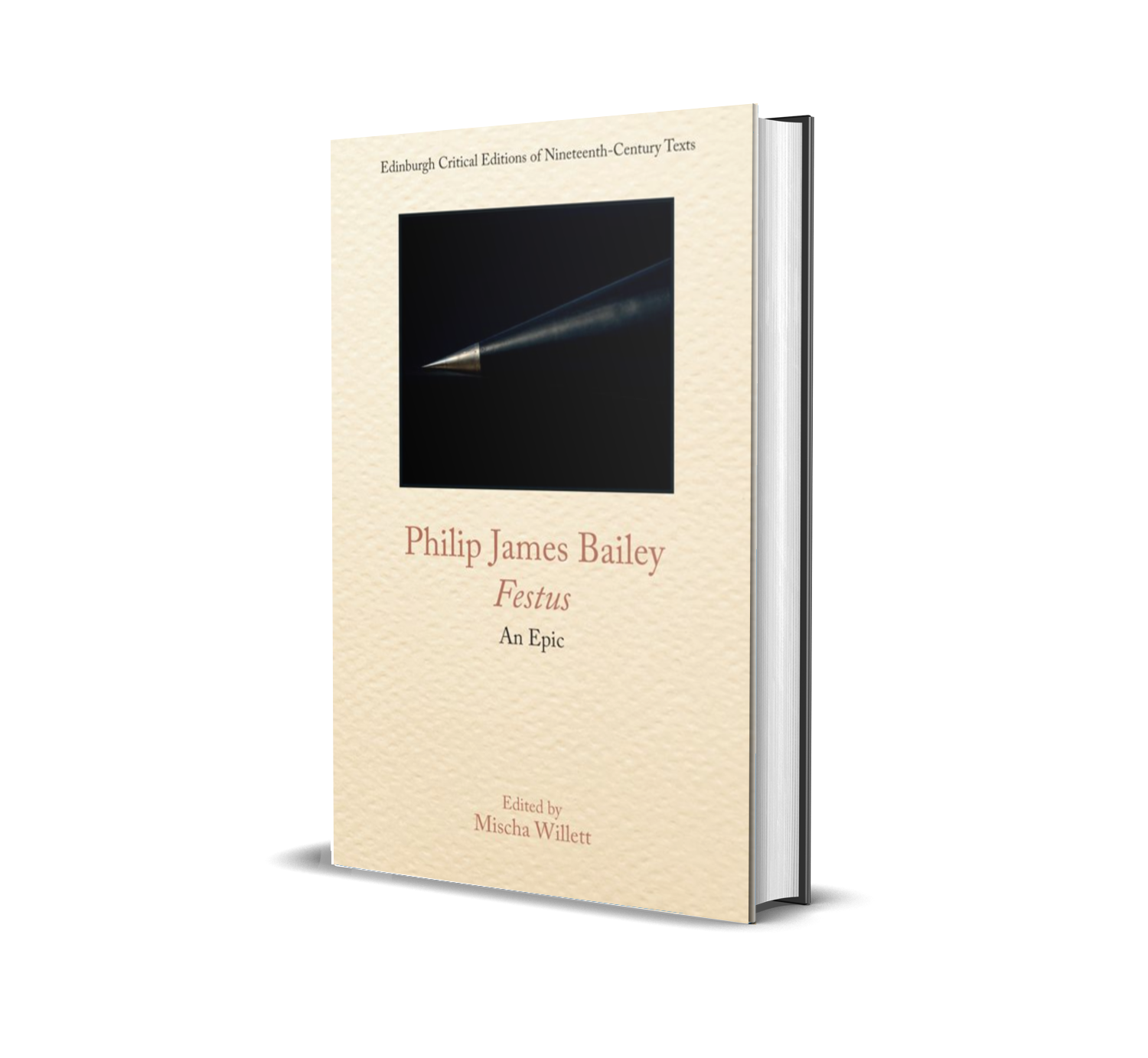Festus
The nineteenth-century epic poem about the world’s end in a readable, modern volume.
Festus
by Philip James Bailey
Edited by Mischa Willett
Edinburgh University Press, 2021
Edinburgh Critical Editions of Nineteenth-Century Texts
ISBN 9781474457811
Overview
This edition is a unique and comprehensive approach to the poem, based on the 1st American edition from 1845 and featuring the author's original 1839 preface.
It includes critical amendments such as explanatory annotations and line and scene numbers, making this previously obscure work more accessible and easier to understand. The annotations provide explanations of obscure terms, archaisms, and historical references, as well as offering factual explanations of these references. In addition, the edition also includes scene headings and brief stage directions, which have been retained from previous editions and numbered for ease of reference.
Philip James Bailey
Literary and Historical Context
Phillip James Bailey's poem Festus was first published in 1839, during the Victorian era, a time of great social, cultural, and technological change in Britain. The poem's reception was mixed at first, with some critics praising its ambition and originality, while others found it difficult to categorize and understand.
Festus reflects the influences of several literary and philosophical traditions, including epic poetry, theology, and mysticism. Bailey drew inspiration from the works of the Romantic poets of the early 19th century, as well as from Dante, Milton, and other great epic poets of the past.
The poem explores themes of love, faith, and redemption, as well as the relationship between God and humanity. It also reflects the tensions between traditional religious values and the emerging scientific and secular worldviews of the time, as well as the social and economic upheavals that accompanied the Industrial Revolution.
Festus is notable for its exploration of radical theological ideas, including the restitution of Lucifer to Heaven, a theme that caused controversy and even accusations of heresy at the time of its publication. Despite these criticisms, the poem was immensely popular and influential, inspiring numerous imitations and adaptations in the years that followed.
Mischa Willett's edition of Festus offers readers a deeper understanding of the historical and literary context of this influential work. By situating the poem within the broader context of Victorian literature and society, the edition sheds light on the cultural and intellectual currents that shaped Bailey's writing and the reception of his work. This edition is an essential resource for anyone interested in the history and development of Victorian poetry and literature
What People Are Saying…
“Scholars of nineteenth-century culture will want to thank Mischa Willett for this beautifully curated critical edition of Philip James Bailey’s Festus. Seldom read today, Festus was devoured by Victorian readers from all walks of life and was reverenced in literary circles. Willett’s thoughtful introduction unfolds for us the magnificent strangeness, as well as the abiding interest of this remarkable work.”
“There is great exuberance of thought and imagery throughout this work, and a profuse expenditure of both, fearless of exhaustion of the author’s stores. One feels as if one had ‘eaten of the insane root that takes the reason prisoner’ in many passages; or ‘of the tree of knowledge of good and evil,’ with strange elevations of spirit, and stranger misgivings, alternately glowing and shivering through the bosom.”
“In inspiration, in prophecy, in those flashes of the sacred fire which reveal the secret places where time is elaborating the marvels of nature, [Festus] stands alone. This book is a precious, even a sacred book….England has now only two poets that can be named near him.”
Excerpt
We live in deeds, not years; in thoughts, not breaths;
In feelings, not in figures on a dial.
We should count time by heart--throbs. He most lives
Who thinks most--feels the noblest--acts the best.
Life's but a means unto an end--that end
Beginning, mean and end to all things--God.
The dead have all the glory of the world.
Why will we live and not be glorious?
We never can be deathless till we die.
It is the dead win battles. And the breath
Of those who through the world drive like a wedge,
Tearing earth's empires up, nears Death so close
It dims his well-worn scythe.

